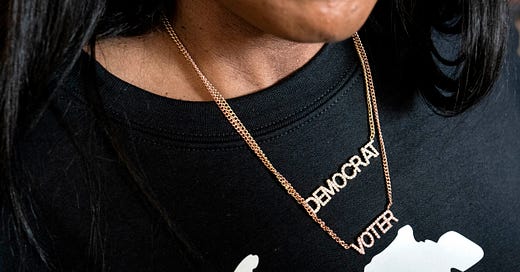The GOP’s Women Problem
From abortion policy to Trump’s skeeziness, Republicans have plenty of reason to worry about women voters in 2024.

CALL ME CYNICAL, BUT I ROLLED MY EYES when I read a passionate argument for a woman’s suffrage monument on the National Mall by four female Republican senators.
It’s a fine idea, of course it is. Yet the centennial of the Nineteenth Amendment granting women’s suffrage is long past—it was four years ago, on August 26, 2020. As for a suffrage monument, legislation to build one on the Mall has been introduced in the last few Congresses. The House finally passed a bipartisan bill on November 6 and the Senate received it the next day. That was nearly five months ago.
The obvious question is why now? The obvious answer is damage control. Good luck with that, GOP.
The urgent display of interest by Sens. Marsha Blackburn, Cindy Hyde-Smith, Cynthia Lummis, and Katie Britt in “a monument commemorating women’s long fight for the right to vote,” announced to the world in a Washington Post op-ed last week, capped several depressing weeks for women at the hands of conservative Republican officials. We’re not talking time-travel to a glorious future. Quite the opposite.
Did a U.S. senator—Alabama’s Britt, one of the coauthors of the suffrage monument op-ed—really impersonate a 1950s housewife in her kitchen at the highest profile moment of her career?
Was an 1873 “chastity law” a serious part of a recent abortion-pill discussion at the U.S. Supreme Court?
Are red-state legislators and jurists really so eager to extend legal “personhood” protections to frozen embryos that they are willing to see IVF effectively outlawed?
Are conditions so dire that women in politics and government—in Arizona, Alabama, Iowa, and beyond—feel compelled to talk about their own experiences with abortions and IVF?
Yes, yes, yes, and yes.
When your party’s State of the Union responder inspires numerous comparisons to The Stepford Wives (“they’re vapid, unfathomably devoted to housework and completely subservient to their husbands,” says Rotten Tomatoes), it’s time to change the subject. Same deal when your policymakers at all levels are edging so close to the dystopian theocracy and captive breeders of The Handmaid’s Tale that “Grab your red robes and bonnets, ladies” in a social media post doesn’t seem hyperbolic.
Clearly the answer is to look back to the nineteenth century and the birth of the women’s suffrage movement. Right?
Well, no. Not only is it irrelevant to the issues at hand, most Republicans aren’t particularly receptive to women in politics. A telling Gallup poll, released last month, asked whether the United States would be better governed with more women in office. There’s a 52-point gap between the parties on that question. While 84 percent of Democrats said yes, it would be, only 32 percent of Republicans agreed.
In fact, added Gallup analyst Lydia Saad, “Republicans today are more inclined to say the country would be worse off with more women in government (43 percent) than to say it would be better off.” Overall, 57 percent of U.S. adults say more women in office would benefit the country—and that includes majorities in all age groups.
The partisan gap in the February poll is actually an improvement over the 67-point gap in 2019, but GOP adults remain vastly out of step with the national consensus. And they are not reacting to an imminent female takeover of anything. Women have miles to go before they achieve parity in elective office, from Congress (they’re 25 percent of the Senate and 29 percent of the House) to governorships (a record 12 in office now) to state legislatures (about one-third female).
As short as those numbers fall, they’re even worse for Republican women. Democrats—whose firsts for women include major-party nominee, House speaker, and vice president—currently have twice as many female governors and state lawmakers, nearly three times as many House members, and (counting independent Kyrsten Sinema) they outnumber GOP senators 16–9.
The imbalance could get more lopsided as Donald Trump brags on the campaign trail about how he kept his 2016 promise to name anti-abortion justices to the Supreme Court. “For 54 years they were trying to get Roe v. Wade terminated and I did it and I’m proud to have done it,” he said in January.
The overturning of Roe, ending the federal legal right to abortion after a half-century, followed by the rush of state abortion bans and the threat of an overriding national ban, have crystallized public opinion: In a new Axios-Ipsos poll, 81 percent of adults (including 65 percent of Republicans) agreed that “abortion issues should be managed between a woman and her doctor, not the government.” In Florida, voters will decide in November if they want to keep a six-week ban that starts May 1 or put Roe-like protections into their state constitution.
While polls show President Joe Biden gaining on Trump among women, I have never understood what women see in Trump. A jury has found him liable for sexual abuse, he had affairs with at least two women while his fifth child by his third wife was less than a year old, he bragged about grabbing women “by the pussy” on the infamous Access Hollywood tape, and his vice presidential search sometimes echoes his Miss Universe pageant days, right down to contestants with “cascading hair, extensive eyelashes and a blinding smile,” as the New York Times put it in an article about South Dakota Gov. Kristi Noem’s new teeth and general transformation into Trump’s perfect “type.”
Britt is also that type, and apparently remains on Trump’s VP list despite her widely panned national TV debut. The weirdness of Britt at her kitchen table, “a proud wife and mom” wearing a jeweled cross, was lost almost instantly in the larger commotion over the even stranger way she delivered her lines—whispers, melodrama, inappropriate expressions—all quickly immortalized in a Scarlett Johansson parody on Saturday Night Live.
But I’m still fixated on the kitchen. A few days after the Britt debacle, during an excavation project on my computer, I came upon a response to a protest letter I had sent in 1975 to the team in charge of Rhoda, the Mary Tyler Moore Show spinoff. It was from Charlotte Brown, an executive script consultant who became TV’s first female showrunner the following year.
“Thank you so much for your sincere concern regarding RHODA,” she wrote of the newly married character. “I’m very sorry that we’ve been ‘depressing’ you with Rhoda’s ‘typical’ behavior. Yes, she has done some laundry, yes, she has done some cooking, but we have tried like hell to keep her out of the kitchen.” Brown added that the show was filming an episode right at that moment in which Rhoda, worried she was “backsliding” in her window-dressing career, took “a big freelance job.”
I was a very young and impatient feminist when I fired off that letter. Nearly fifty years later, I’m a much older but equally impatient feminist. And it is a gut punch to realize that even now, we are still trying like hell to keep women in control of their own lives—whether they want to be in the kitchen, in the Senate, or anywhere else.





